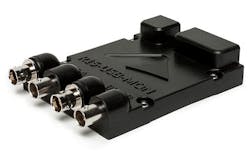Flight-line test and measurement instrument for MIL-STD-1553 avionics introduced by Abaco
HUNTSVILLE, Ala. – Abaco Systems in Huntsville, Ala., is introducing the BT3-USB-MON bus monitor for test and measurement applications that involve the MIL-STD-1553 avionics databus. The test instrument is for use on the flight-line, in the lab, and in the field.
The BT3-USB-MON is designed to make the monitoring and analysis of MIL-STD-1553 signals easier, more convenient and more affordable. It is designed to help users visualize and record 1553 bus traffic for development, testing, trouble-shooting, and debugging. It includes built-in scope outputs, further simplifying the process.
The BT3-USB-MON is a monitor-only device that combines three tools: 1553 visualization and recording software; 1553 monitoring hardware; and scope outputs for electrical analysis. Additionally, the BT3-USB-MON has no transmit or receive functionality for secure bus monitoring.
Abaco's BusTools GUI to simplify 1553 bus monitoring, reducing the learning curve and providing the functionality and flexibility required by experienced 1553 users.
The BT3-USB-MON's integrated differential-to-single-ended 10:1 scope provides output for each bus, together with programmable on-board triggers, allowing data and waveform capture of specific bus events.
The BT3-USB-MON's functionality includes the ability to capture loaded bus traffic with IRIG synchronized time-tagging, error status, word status, and message status.
Filtering and triggering options include by individual RT/sub-address; transmit, receive, or broadcast mode codes; internal or external triggering; and trigger output on user-specified data.
For more information contact Abaco Systems online at www.abaco.com.
Learn more: search the Aerospace & Defense Buyer's Guide for companies, new products, press releases, and videos

